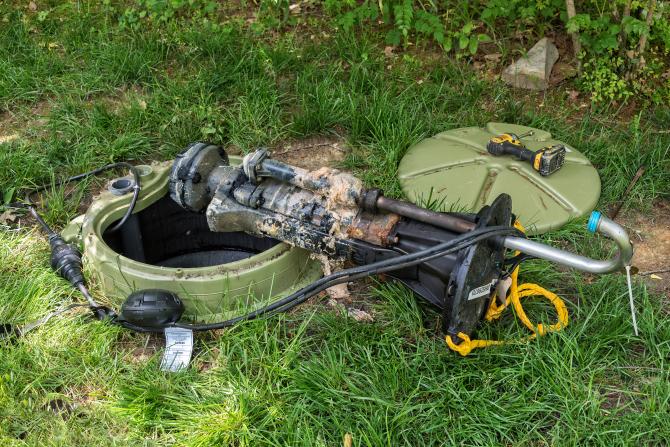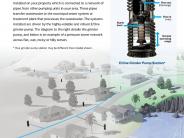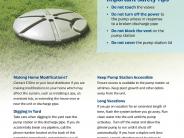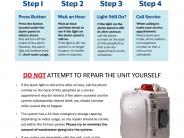Grinder Pumps
If you're hearing a grinder pump alarm, please call us immediately at 360-876-2545
What is a grinder pump and why is it important?
Grinder pump sewer systems are used in areas where gravity service is not available. Wastewater normally flows downhill by gravity from a home's internal plumbing to a side sewer lateral and into the main line public sewer. When a structure served by a sewer is at a lower elevation than the sewer main, it requires the use of a pump to force the wastewater up to the gravity sewer main or through a force main. A grinder pump grinds up the constituents in wastewater from a home and pumps it into the public sewer system.
A grinder pump is placed in a tank that is buried in an outdoor location on your property. The tank provides wastewater holding storage capacity. When water is used in the house, wastewater flows into the tank. When the wastewater in the tank reaches a preset level, the grinder pump automatically turns on, grinds the waste, and pumps it out of the tank via a pressure discharge line into the public sewer system and automatically turns off when the wastewater in the tank reaches the preset off level.
A grinder pump is a pumping system with many components. Typical installations include a tank, pump assembly, level controls, piping, valves, and electrical. The pump is powered by electricity and is connected to a control panel typically mounted on the side of the structure it serves or near the tank. The circuit breaker is typically located within the electrical panel of the structure it serves.
The grinder pump systems within the District are comprised of E-One pump systems due to their efficiency and reliability. Below is an owner's guide to better help you understand the grinder pump system and its use. Additionally, you will find a downloadable/printable version for your reference. Content/brochure is used with permission of Environmental One Corporation.
What's the alarm you're hearing and why is it going off?
If there is too much flow going into your grinder pump unit, the higher sewage level will trigger an alarm horn and light to alert you to a problem. Stop all use of water (Toilets, dishwashers, washing machine, showers etc) and call the District.
You will find a button to silence the alarm on the external portion of the electrical box located near the grinder tank. Push this button to turn off the alarm and call the District. A staff member will respond to check out your system.
If your grinder pump alarm is going off, do not flush or use water!
Your storage tank level can be too high to receive any additional water or wastewater. To protect your property do not flush your toilet or use any water until the District has cleared you to do so.
How does a power outage impact grinder pump function?
During a power outage, your grinder pump will not function, so it's important not to flush toilets or use water as this can cause sewage to back up into your home. Many of our customers own and operate generators during power outages. Before purchasing and using a generator for your grinder pump, always consult a licensed electrician.
How to treat your grinder pump system.
All dischargers to sewers should be aware of undesirable substances that should never be flushed into the sewer, especially a grinder pump system. Never flush dental floss, fats, oils, grease or grit (FOGG), feminine hygiene products, condoms, diapers, wipes, cotton swabs, cigarette butts, coffee grounds, cat litter, or other items that can clog and potentially damage your Grinder system. These items should be disposed of in your garbage.
The flushing of household or other chemicals, gasoline, oil, pesticides, antifreeze, and paint can present a safety hazard in the system and are considered illegal to dispose of in the sewer system. These items should be taken to the appropriate local hazardous materials handling or recycling station and disposed of safely and legally.








